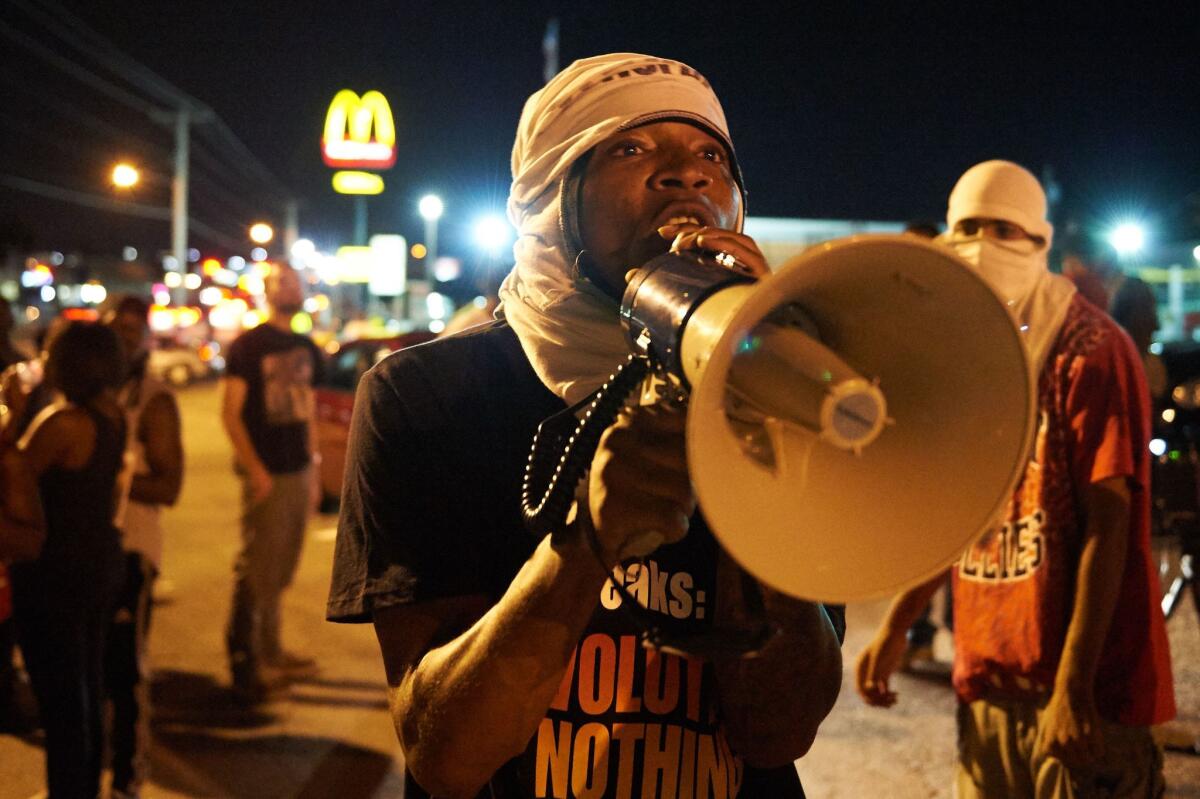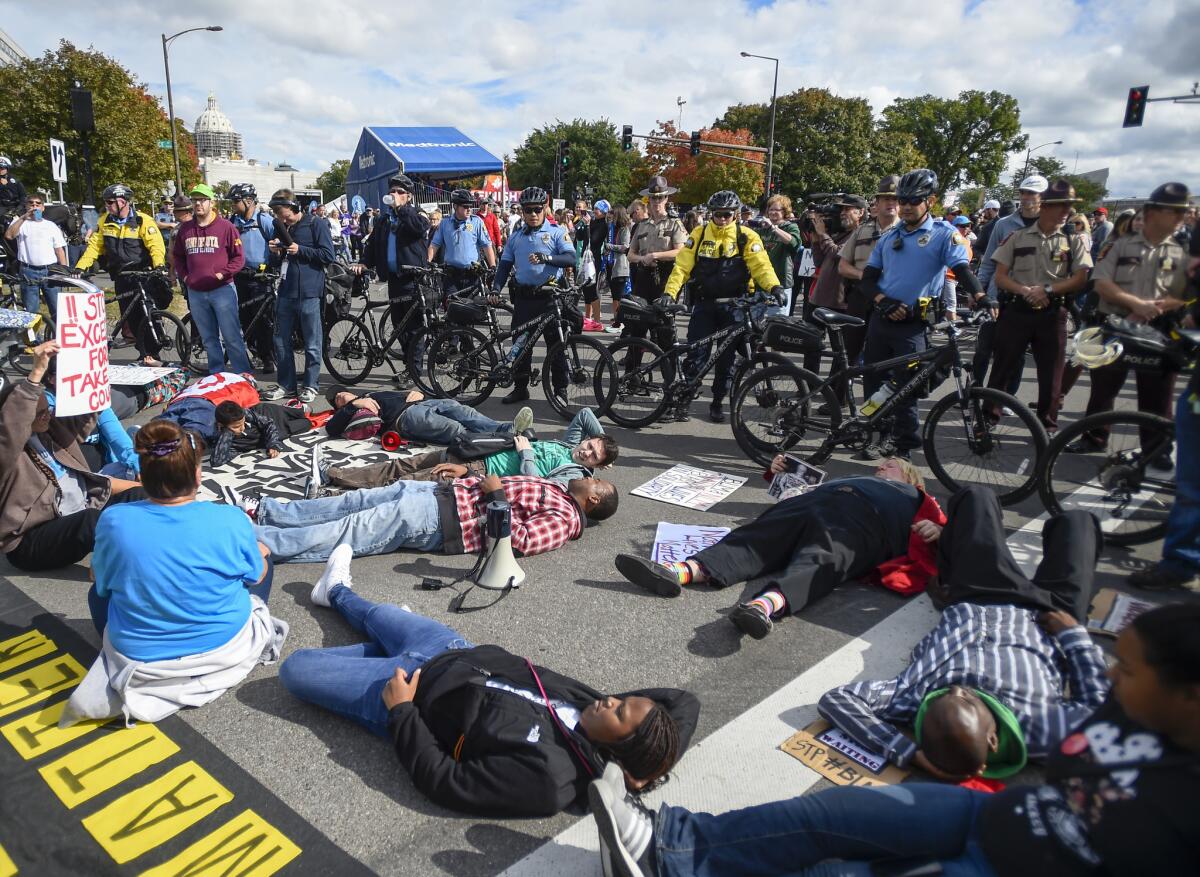Most black millennials say they know or have been victims of police abuse, report says

A man encourages demonstrators during an August protest in Ferguson, Mo.
- Share via
Millennials have been called America’s most racially diverse generation, but African Americans say they are doing worse than their generational peers in other racial groups when dealing with police violence, poverty and the legal system.
In what is likely the most comprehensive look at black millennials, researchers found that more than half said they or someone they knew had been harassed or treated violently by police.
In one positive note, black millennials also said they were more positive than whites and Latinos about the role of politics to forge change.
“Black Millennials in America,” a report by the Black Youth Project at the Center for the Study of Race, Politics and Culture at the University of Chicago, assembled surveys and government statistics over more than a decade that paint a dire portrait of African American men and women ages 18 to 34 when compared with their peers in other racial groups.
“There is a myth that millennials are a coherent, cohesive group,” said Cathy J. Cohen, one of the study’s authors. “Rarely have people paid attention to the role of race in shaping opinion and the differences among young people.”
In general, blacks were more likely to be poorer and unemployed and said they faced a greater possibility of gun-related violence and discrimination than those in other groups, according to the report.
Cohen, chairwoman of the University of Chicago’s political science department and leader of the Black Youth Project, was one author. The other was Jon C. Rogowski, assistant political science professor at Washington University in St. Louis.
In general, “things have been getting better over time,” Cohen said. “We elected a black president and we have moved toward a colorblind society. But in the last year we have found that race still matters, particularly to African Americans, when it comes to issues like police and incarceration where they face a disproportionate negative impact from the state in the lives of people of color.”
The study comes after a year of turmoil along the axes of race and police and amid a continuing debate on the effect of race in education and incarceration.
Officials and community activists have been wrestling over changes in the aftermath of the deaths of Trayvon Martin, an unarmed black teenager killed in 2012 by a white former neighborhood watch volunteer in Florida; Michael Brown, an unarmed black 18-year-old killed last year by a white police officer in Ferguson, Mo.; and Freddie Gray, 25, a black man who died in police custody in Baltimore this year.

Police officers use bikes to block protesters as supporters of the Black Lives Matter group hold a “die-in” near the finish area of the Medtronic Twin Cities Marathon in St. Paul, Minn., on Oct. 4.
Those deaths helped spawn the Black Lives Matter movement, which picked up steam and legitimacy with the help of social media. It has become its own political force, touching the race for the presidential nomination of the Democratic Party, which generally supports criminal justice reform and gun control.
Among the study’s key findings are the starkly different views of blacks when compared with other millennials on issues that include policing, guns, the legal system and violence.
In a 2009 Mobilization and Change Survey done by the Black Youth Project and cited in the report, 54.4% of black millennials answered yes to the question: “Have you or anyone you know experienced harassment or violence at the hands of the police?” About one-third of whites, 32.8%, and about one-quarter of Latinos, 24.8%, said yes to the same question.
Blacks were also far less likely to trust police, 44.2%, compared with 71.5% of whites and 59.6% of Latinos. About two-thirds, or 66.1%, of black millennials agreed that cops were in the neighborhood for protection, compared with 80.3% of whites and 74.4% of Latinos.
Gun violence continued to be a special concern as well.
Just over a fifth, 22%, of black millennials interviewed in 2013 said they or someone they knew were the victim of gun violence in the last year. That compared with 14% of Latino millennials and 8% of whites.
Yet the same survey, called the Black Youth Project Quarterly Survey, found that 24% of blacks and 22% of Latino millennials said they or someone they knew “carried a gun in the last month.” Almost half of white millennials, 46%, said they knew of someone who carried a gun.
Black millennials were the most pessimistic about the American legal system. Just 26.8% agreed with the statement: “The American legal system treats all groups fairly,” according to a 2014 Black Youth Project survey in the report. More than a third of other young U.S. residents — 41% of whites, 36.7% of Latinos — agreed that everyone gets treated fairly by the legal system.
Black millennials were found to be more positive than their peers in one area: The role of politics to forge change. About 71% surveyed said they “believe that they can make a difference through participating in politics,” compared with about half of whites surveyed and 56% of Latinos, according to a June 2014 survey.
That’s in keeping with 2012 data showing black youth turning out at the polls at higher rates than white youth in both the 2008 and 2012 elections.
Some would say Barack Obama’s candidacy and presidency explain why black millennials are relatively politically optimistic, Cohen said.
‘If you give young people a candidate they can support, they will go to the polls,” she said. “That’s not a small lesson.
“Will it be the same this year without Obama and without his campaign spending money and resources to mobilize the young?” she asked. “We’ll just have to see.”
ALSO:
Houston voters reject LGBT equal rights measure
Ohio voters soundly reject marijuana legalization initiative
Pentagon suspends troubled missile defense system at center of ‘runaway blimp’
More to Read
Sign up for Essential California
The most important California stories and recommendations in your inbox every morning.
You may occasionally receive promotional content from the Los Angeles Times.














